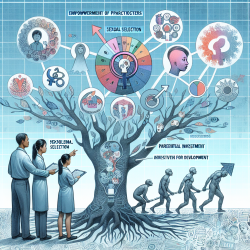Introduction
As practitioners in the field of speech-language pathology, we are constantly seeking ways to enhance our understanding and improve the outcomes for children with Autism Spectrum Disorder (ASD). The research article "An International Clinical Study of Ability and Disability in Autism Spectrum Disorder Using the WHO-ICF Framework" offers valuable insights into the diverse functional profiles of individuals with ASD. By leveraging the WHO-ICF framework, we can adopt a more holistic approach to assessment and intervention, ultimately fostering better outcomes for our clients.
Understanding the WHO-ICF Framework
The International Classification of Functioning, Disability and Health (ICF), endorsed by the World Health Organization, provides a comprehensive framework for describing health-related functioning. The ICF-CY, a child and youth version, expands on this by capturing functional abilities and disabilities specific to developing individuals. This framework considers not only medical or biological aspects but also contextual factors, offering a bio-psycho-social model of functioning.
Key Findings from the Study
The study involved 122 individuals with ASD across 11 clinical units from 10 countries. It identified 139 ICF-CY categories, highlighting the heterogeneity of ASD. These categories were distributed across activities and participation, body functions, and environmental factors, reinforcing the need for a multidisciplinary approach in ASD assessment.
- Activities and Participation: Challenges were noted in communication, social interaction, mobility, self-care, and participation in civic life.
- Body Functions: Impairments were observed in cognitive functions, motor coordination, sensory processing, and speech fluency.
- Environmental Factors: Support from family, attitudes of peers, and availability of services were significant in influencing ASD-related functioning.
Implications for Practitioners
By integrating the WHO-ICF framework into clinical practice, practitioners can gain a more nuanced understanding of the multifaceted nature of ASD. Here are some ways to apply these findings:
- Holistic Assessment: Use the ICF-CY framework to conduct comprehensive assessments that consider both functional impairments and strengths, as well as environmental facilitators and barriers.
- Individualized Interventions: Tailor interventions based on the unique functional profile of each child, addressing both challenges and leveraging strengths.
- Environmental Modifications: Collaborate with families and educators to modify environments, reducing barriers and enhancing facilitators to improve participation and engagement.
Encouraging Further Research
The study underscores the importance of continued research into the functional profiles of individuals with ASD. Practitioners are encouraged to contribute to this body of knowledge by documenting outcomes and sharing insights from their clinical experiences. This collaborative effort can lead to the development of standardized tools and interventions that are culturally sensitive and globally applicable.
Conclusion
The integration of the WHO-ICF framework into clinical practice offers a promising pathway to enhance our understanding and improve the lives of individuals with ASD. By adopting a holistic, data-driven approach, we can create more effective interventions and foster positive outcomes for children with ASD.
To read the original research paper, please follow this link: An International Clinical Study of Ability and Disability in Autism Spectrum Disorder Using the WHO-ICF Framework.










